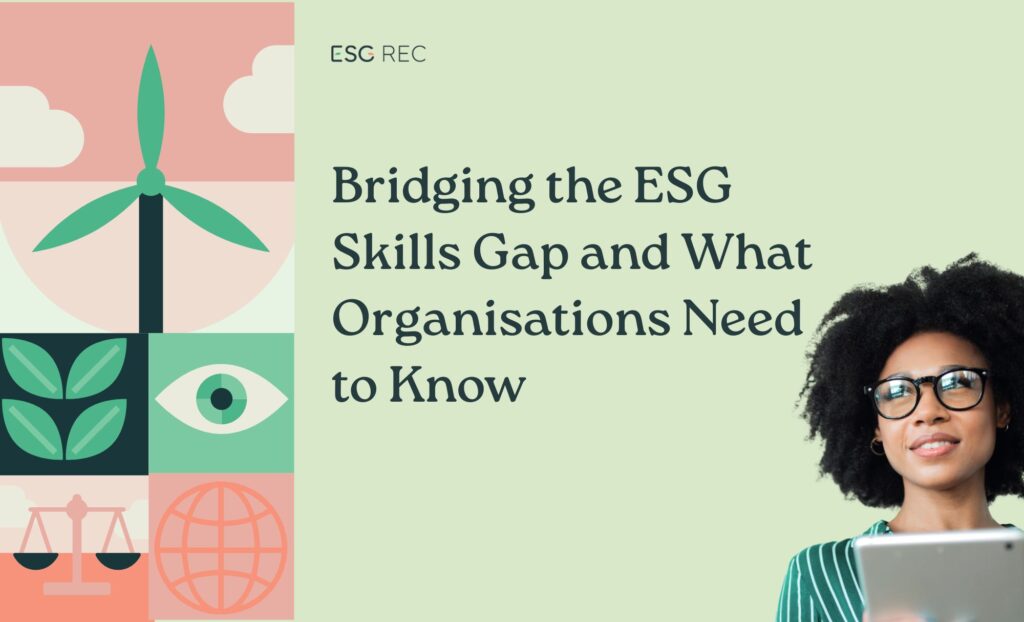
ESG Skills Gap UK is a growing challenge for organisations, as the shortage of professionals with sustainability expertise continues to rise. With increasing pressure from regulators, investors, and consumers, UK organisations must ensure they have the right talent to meet their ESG objectives. Addressing this gap is essential not only for compliance but also for long-term business resilience (UK Government: Net Zero Strategy).
Sectors such as finance, energy, construction, and professional services are seeing particularly high demand for ESG specialists. Companies need professionals who can navigate complex environmental regulations, deliver sustainable projects, and manage social and governance risks effectively. Insights from ESG professionals highlight that financial considerations remain a practical driver for candidates. Rising living costs and inflation mean many professionals are seeking roles that offer competitive compensation alongside development opportunities.
Understanding the ESG Skills Gap UK
The ESG skills gap UK refers to the shortage of professionals with expertise across environmental, social, and governance areas. Key areas of need include:
- Sustainable finance: investment strategies, ESG reporting, and regulatory compliance (Financial Reporting Council)
- Environmental management: carbon accounting, energy efficiency, and environmental compliance (UK Climate Change Committee)
- Social and governance oversight: corporate responsibility, stakeholder engagement, and ethical governance (Institute of Business Ethics)
Recent studies indicate that UK organisations struggle to fill ESG-related positions quickly, with some roles remaining vacant for six months or longer (LinkedIn: ESG Jobs Report). Emerging ESG roles such as Climate Risk Analyst, ESG Data Specialist, and Sustainability Consultant are in particularly high demand. You can also explore Insights into the Green Skills Landscape in the UK for additional context.
Strategies to Bridge the ESG Skills Gap UK
Upskilling Employees to Address the ESG Skills Gap UK
Investing in internal training programmes is one of the most cost-effective ways to enhance ESG competencies. Organisations can implement workshops, online learning modules (Coursera ESG Courses), and mentorship programmes (ESG Training Services) to equip employees with the necessary skills. This approach supports retention by demonstrating a commitment to career growth and internal mobility.
Collaborating with Educational Institutions
Partnerships with universities, colleges, and professional training providers can help create ESG-focused curricula tailored to industry requirements (University of Cambridge Institute for Sustainability Leadership). Offering internships, apprenticeships, or guest lectures builds a pipeline of talent ready to enter ESG roles with practical experience (ESG Insights Blog).
Recruitment Approaches to Close the ESG Skills Gap UK
Attracting ESG talent requires thoughtful recruitment approaches. Organisations should offer competitive remuneration packages alongside meaningful projects that demonstrate impact on sustainability goals (Green Jobs Network). Highlighting development opportunities, mentorship, and career progression can make roles more appealing to top candidates.
Mentorship and Peer Learning
Mentorship programmes and peer learning circles allow experienced ESG professionals to guide newer team members. This accelerates skills development and fosters a culture of knowledge-sharing and collaboration (CIPD: Learning & Development).
Building an ESG-Ready Workforce
To create a workforce capable of supporting ESG objectives, organisations should:
- Assess current employee skill levels against ESG requirements
- Implement structured training programmes to close skill gaps
- Foster a culture of sustainability across all teams
- Consider financial and non-financial motivators to attract and retain talent
Challenges and Considerations for the ESG Skills Gap UK
Closing the ESG Skills Gap UK is not without challenges. Organisations may face budget constraints, resistance to cultural change, or difficulty balancing immediate operational needs with long-term skills development. Planning strategically, aligning ESG initiatives with business goals, and engaging leadership are key to overcoming these barriers.
Looking Ahead: Why Addressing the ESG Skills Gap UK Matters
Investing in ESG talent development is not merely a cost—it is a strategic advantage. Organisations that prioritise ESG skills can improve operational efficiency, reduce risks, and enhance their reputation with investors, customers, and employees (World Economic Forum: ESG Skills).
Companies that successfully close the ESG Skills Gap UK are better positioned to innovate, meet sustainability regulations, and achieve long-term business resilience. You can also refer to Definitive ESG Talent Market Insights for UK Employers for market trends.
ESG REC provides expertise and market insight to help UK organisations identify and secure the talent they need to thrive in this critical area.


